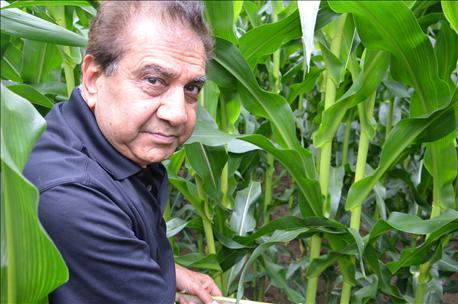
Dave Nanda talks to a lot of farmers. The former plant breeder, owner of his own consulting business and consultant for Seed Consultants, Inc., recently posed a question to a young farmer in his 30s. Would you rather be called a farmer or a grower?
“He told me he preferred being called a grower,” Nanda says. “He felt that many non-farm people still think of farmers as uneducated, but he sees himself as a businessman who knows how to grow and market crops, and understands how to use new technologies in raising crops more profitably.”

RAISING AN INTERESTING QUESTION: Dave Nanda discovered that some farmers, at least younger farmers, would rather be called a grower than a farmer.
When Dave brought up these comments, and noted for the most part he agreed with the young farmer’s view, I told him we would have to agree to disagree. Here is the conversation that unfolded.
Tom: “I’ve never really asked a farmer which name he prefers, but I have the hunch many would still rather be called farmers. Most grew up wanting to do nothing but farm. They may grow crops, but they are more than that. Farming is a way of life- growing is just a process- raising corn, soybeans or some other crop. If you raise livestock, I suppose the choice is between being called a farmer and a producer.”
Nanda: “You’re off base on this one Tom. When someone hears of a ‘farmer,’ they often still think of an older guy with a pitchfork and a wife with a scarf on her head. They don’t think about a highly educated businessman and his partner, a highly educated businesswoman. Many farm wives know more about computers, education and marketing than their husbands. The husbands tend to be very good at buying inputs, attending meetings and acquiring new knowledge, negotiating prices, toiling for long hours growing crops and are also good at marketing. ”
Tom: The famous Super Bowl commercial of a few years ago featured the late Paul Harvey, featuring a rendition of a poem, ‘God Made a Farmer.’ It wasn’t entitled God made a grower.’
Nanda: Tom, ‘farmer’ is a very good term, but in today’s environment , ‘grower’ somehow carries more weight and prestige with urban readers who only want to talk about non-GMOs and whether a crop is organic.”
Tom: “Maybe some people think of a guy with a pitchfork, but when I hear the word ‘farmer,’ I think of someone who grew up on the land, works long hours, and is proud of what he or she does. They would rather farm than do anything else.”
Nanda: “I’ve called farmers I have worked with ‘growers,’ and their face has lit up. I think they enjoyed being recognized as someone more than just a farmer.”
Tom: “Hold on a minute, Dave. Where did that term ‘grower’ first come from, anyway? The first time I remember hearing it was in press releases from chemical companies, or chemical companies that were also becoming seed companies. They also run commercials about farmers doing ‘fist bumps; when they get high yields, but I don’t see any farmers doing fist bumps. I’m not sure how companies or marketing people look at farmers is how farmers and their families look at themselves.”
Nanda: But Tom in today’s world, you need to look at how the public views farmers too. When they hear the word ‘farmer,’ my guess is many still think of the older, not-so-well educated farmer. If they hear the word ‘grower’ they think of someone who is business oriented, highly trained and progressive. It gives farmers a better image amongst the public, which comprise more than 98% of the population. ”
Tom: “I think it depends upon the audience, Dave. When farmers are with each other, farmer is a term of respect. Farming is more than a business, even today. It is still a way of life. The term farmer relates that to others. You don’t hear of groups awarding ‘conservation grower of the year.’ No, they call it the ‘conservation farmer of the year.’”
Nanda: Tom, people in the press and those giving awards coined these phrases. Remember, NCGA stands for National Corn Grower’s Association, not National Corn Farmer’s Association. I think both farmer and grower are good terms and can be used interchangeably. It depends on who the audience is! I think you ought to reconsider what you call farmers when you
Which name do you prefer? Are you a farmer or a grower? Let us know which name you believe fits you best. Email your choice, and your reasons why, [email protected]. |
About the Author(s)
You May Also Like




